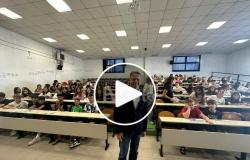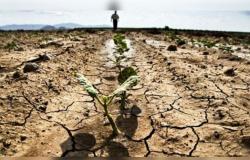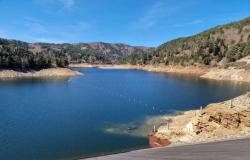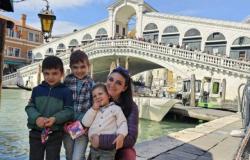Vivian and Tatiana are very close friends. When they don’t see each other at work they video call each other to keep each other company on the journey home, which they take on the bus. They live in Bologna, in two different parts of the city, but they both work at Cirfood. The cooperative, which has its headquarters in Reggio Emilia, deals with catering and is made up of ninety percent women. Vivian and Tatiana were hired in 2022 to work in the canteen of the Maggiore hospital in Bologna.
Since 2018, Cirfood has collaborated with the Reception and Integration System (SAI) project of the municipality of Bologna. Starting from 2021, she has been involved in the I-care project of the Trans Identity Movement (MIT) and the Cidas cooperative, which, thanks to European and national funds for asylum policies and services, supports applicants and holders of international protection, adults and vulnerable.
In this case the commitment was to define guidelines for raising awareness and involving various local entities for the job placement of trans people. “At Cirfood no one looks at me strangely. It had never happened to me before,” says Tatiana.
The Cidas headquarters in Bologna.
(Simona Pampallona for Internazionale)
Tatiana returns to her house by bus.
(Simona Pampallona for Internazionale)
Vivian and Tatiana are originally from Brazil. Tatiana arrived in 2003. Vivian ten years later. For both of them it wasn’t easy at the beginning: “I came here because a friend of mine was here. The work, however, was different from what I thought. They exploited me, made me work as a sex worker. Without a contract, after some time I also remained without documents,” says Vivian. To get out of this situation, the woman came into contact with the Orizzonti project, in Padua, where she was able to count on their protection network for a year and a half. Then they proposed that she return to Bologna and introduced her to the Cidas operators. With their support she entered shared accommodation, called Casa Caterina, where she remained for three years.
Vivian arrived in Pisa in 2013, where she met a man who forced her into prostitution. She took her with her to Sicily: “I stayed with him for five years. She beat me. At a certain point I said enough and called the police.” At the police station Vivian met a social worker, who put her in touch with a lawyer. Shortly thereafter she met a man who offered her a house to live in. At that time she Vivian had a room in a dormitory, so she agreed. “He was married, he locked me in the house with a chain. Unfortunately I was very unlucky. He wouldn’t let me go out. He would lock me in there and go back to his house,” she says. Thanks to the lawyer she managed to find an integration project, she met the Cidas operators and was assigned shared accommodation in Bologa, called Casa Marielle.
Tatiana and Vivian at the Bologna station.
(Simona Pampallona for Internazionale)
Bologna.
(Simona Pampallona for Internazionale)
Casa Caterina and Casa Marielle are part of the Sai project of the municipality of Bologna and are dedicated to welcoming trans people seeking asylum and refugees. They were opened in 2018 and 2021 as part of the metropolitan project managed by ASP of the city of Bologna.
Casa Marielle is located in Borgo Panigale, a neighborhood just outside Bologna, while Casa Caterina is close to the center. People who are victims of discrimination are included in a process of social and work inclusion. Among the services offered there are psychological and health support, orientation and legal accompaniment, teaching of the Italian language and work inclusion to achieve autonomy.
Tatiana on video call with Vivian.
(Simona Pampallona for Internazionale)
Photos hanging at Casa Marielle, Bologna.
(Simona Pampallona for Internazionale)
The operators also help the guests with practical matters: shopping, organizing cleaning shifts, dealing with bureaucratic and medical procedures. Thanks to Cidas, access to hormonal medical care and the beginning of the transition process is simplified, or at least facilitated. The journey is long, psychologically and physically tiring due to the taking of drugs, the surgical operation and the change of personal identity.
“Changing the name on the document is very expensive. You must pay for the psychodiagnostic and medical assessment and the legal costs for the civil proceedings. It takes years. For now I can’t,” says Vivian. Tatiana, however, made it: “When I was looking for a house, knowing that the right name was on my document reassured me. Many friends have this problem: the fear of document checks, for work and for rent.”
The Sai project collaborates with the MIT of Bologna. Founded by Porpora Marcasciano in 1979, the MIT is the oldest space for the affirmation and fight for LGBT+ rights. Every week, among the blow-ups of Marcellona (Marcella Di Folco, the first trans woman to hold a public position as city councilor in 1995) an open meeting is held where you can introduce yourself and talk about yourself, or simply listen. A space frequented by young and old. Vivian and Tatiana go when they can: “It’s important to support each other,” they say.
Vivian in her home in Bologna.
(Simona Pampallona for Internazionale)
Cassero, a place of historical importance for the LGBT+ movement.
(Simona Pampallona for Internazionale)
After living in the Sai project houses for several years, Vivian and Tatiana found their own place. Vivian lives with her boyfriend, while Tatiana has a room in a house with other people near the center of Bologna. “Despite the permanent employment contract, finding a house in the city was very difficult,” she says. “Every morning I called every ad I found. I woke up at 6. I finally made it. I live with a couple of students and a man who has family in Latina. He worked there in a supermarket, which then moved him to a branch in Bologna. In two years he will retire, so he will finally come home.” Tatiana has a boyfriend who lives in a small village in the Veneto region. On weekends she takes the train to go to him.
A Brave New Europe – Voyager is a project of Slow News, Percorsi di Secondo Welfare, Internazionale, Zai.net, La Revue Dessinée Italia and Radio Popolare, co-financed by the European Union. The editorial staff and publications, the authors, work independently from the European institutions and are solely responsible for the contents of this project.
The European Commission is in no way responsible for how the information contained in this project will be used.





